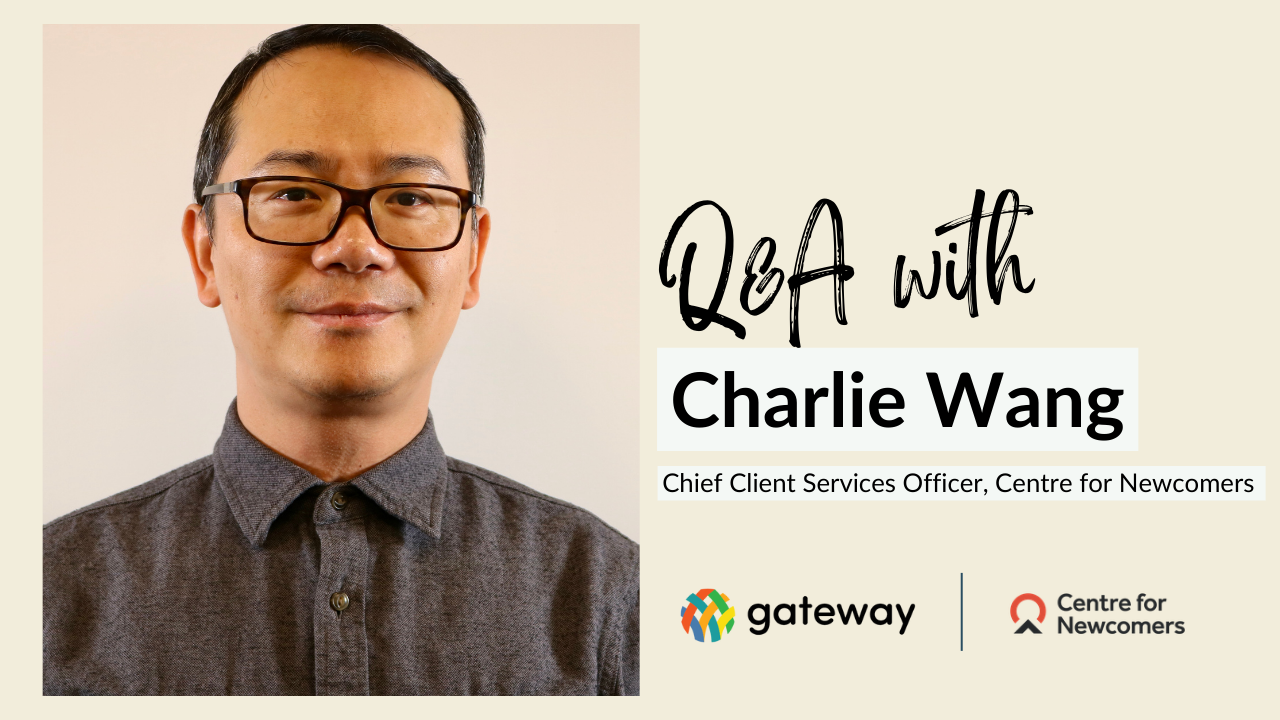
One by one, we’re featuring Q&As with all of our partners so you can get to know them — and their work — a bit better.
This July, find out the challenges, rewards, and motivators for Charlie Wang, the Chief Client Services Officer at the Centre for Newcomers (CFN).
Answers have been edited for clarity and length.
Question: Describe your organization’s mandate.
Answer: As a newcomer-serving agency, we serve newcomers based on their needs. We try to help their inclusion process and find the right services in a timely manner, whether that’s settlement, language, employment services, or case management, and we serve the LGTBQ community as well.
And so, it’s basically to help newcomers who settled in this country to smooth their inclusion process as a new Canadian.
Q: What led you to where you are now professionally?
A: I joined CFN back in 2007, and I came as a newcomer myself. I landed in 2004 and spent my first two years at the University of Calgary, obtaining my Master of Education, and my major was teaching English as a second language. So that’s why I started as a Language Instruction for Newcomers to Canada (LINC) teacher; that was my first job at CFN.
Then, when the opportunities arose, I moved on to junior and senior management positions, and now I work in a leadership position.
Currently my portfolio at CFN includes LINC, settlement and employment services, youth and children’s programs, and also their Indigenous education for newcomers.
Q: What does a usual workday look like for you?
A: I had two meetings this morning, and one of the questions that came up was, “What do you think Charlie should stop doing?”
I am the main contact of Immigration, Refugees and Citizenship Canada across the agency, and I do narrative reporting and financial claims. I also meet with my team, and go to employment meetings, settlement meetings, and youth team meetings.
In a leadership role, if you don’t give your approval or the green light, people have to wait before they can take any action. So I try to respond to people in a very timely manner, and on a daily basis I receive about 150 working emails.
And I have five meetings today, including this one, so this is basically how my day looks like — I usually need to catch up a little bit after working hours.
Q: What is the most rewarding part of your work?
A: I think one thing is really to see our client’s success. And it doesn’t matter how little, how minor, that is. When we see those client comments left on our website, or emails sent to our frontline workers who helped them, saying CFN helped them with their journey as a newcomer — that’s really rewarding.
The second part is to see my own team’s growth. We see many people who have grown from a frontline worker into management and leadership roles, like myself. So allowing teams to grow with the agency, and seeing their success, is really rewarding as well.
Q: What is the most challenging part?
A: It’s a large portfolio, so basically, you need to put all the dots together. As we take on more and more programs, we really encourage a lot of cross-team work, and sometimes people aren’t used to that. So I see some resistance, and also a lot of hesitation, to collaborate. That’s a challenge, but after we successfully did a couple of innovative projects, I saw people accepting and even welcoming collaborating with other teams.
At CFN, we are always excited about collaboration, and that’s why we are the first ones to sign up with Gateway as a partner, and we can see the growth of the Calgary Newcomers Collaborative powered by Gateway, which was the first of its kind in the city.
So, I think we really try to encourage those collaborative partnerships and collective efforts. It’s not easy at the beginning, but I think as you go through, people see the beauty of those partnerships. And in that way, it’s both a challenge and a reward.
Q: What motivates you?
A: To see the clients and the teams succeed. When you start programs from scratch, you do the research, you put all the data together, you send application and do a negotiation until the agreement is signed. Then you start recruiting, produce the training, deliver the services.
If you kind of go through the entire process, it’s really good motivation for you to do more, and to bring more innovative ideas and convert them into real programs to serve real people.
Q: What’s the most valuable thing you’ve learned so far?
A: How to work as a team. It doesn’t matter how small or how large the team is. Even if it sounds like you’re in your own world, that’s not the case — everyone is learning from your experience. We encourage everyone to collaborate, share their success and challenges, so everyone can learn from each other.
Q: What are your hopes for your organization’s sector?
A: I’d like to see more collaboration and partnerships. We’re already doing, I think, a great job. In the newcomer sector, organizations are trying to put all their resources and information together, but some haven’t participated, and we hope to really see a change. Because each organization has their own strengths.
Recent Comments